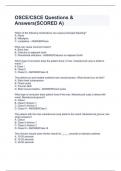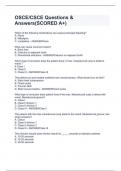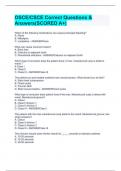Oscecsce stuvia - Study guides, Class notes & Summaries
Looking for the best study guides, study notes and summaries about Oscecsce stuvia? On this page you'll find 3 study documents about Oscecsce stuvia.
All 3 results
Sort by

-
OSCE/CSCE Questions & Answers(SCORED A)
- Exam (elaborations) • 12 pages • 2024
- Available in package deal
-
- $13.99
- + learn more
Which of the following medications can cause prolonged bleeding? A. Plavix B. Nifedipine C. Loratadine - ANSWERPlavix What can cause recurrent caries? A. Bone loss B. Calculus on adjacent tooth C. Periodontal infections - ANSWERCalculus on adjacent tooth Which type of occlusion does the patient have, if max. mesiobuccal cusp is distal to mand.? A Class I B. Class II C. Class III - ANSWERClass III The patient you just treated suddenly lost consciousness. What should you...

-
OSCE/CSCE Questions & Answers(SCORED A+)
- Exam (elaborations) • 12 pages • 2024
-
Available in package deal
-
- $12.49
- + learn more
Which of the following medications can cause prolonged bleeding? A. Plavix B. Nifedipine C. Loratadine - ANSWERPlavix What can cause recurrent caries? A. Bone loss B. Calculus on adjacent tooth C. Periodontal infections - ANSWERCalculus on adjacent tooth Which type of occlusion does the patient have, if max. mesiobuccal cusp is distal to mand.? A Class I B. Class II C. Class III - ANSWERClass III The patient you just treated suddenly lost consciousness. What should you...

-
OSCE/CSCE Correct Questions & Answers(SCORED A+)
- Exam (elaborations) • 12 pages • 2024
-
Available in package deal
-
- $12.49
- + learn more
Which of the following medications can cause prolonged bleeding? A. Plavix B. Nifedipine C. Loratadine - ANSWERPlavix What can cause recurrent caries? A. Bone loss B. Calculus on adjacent tooth C. Periodontal infections - ANSWERCalculus on adjacent tooth Which type of occlusion does the patient have, if max. mesiobuccal cusp is distal to mand.? A Class I B. Class II C. Class III - ANSWERClass III The patient you just treated suddenly lost consciousness. What should you...

Do you wonder why so many students wear nice clothes, have money to spare and enjoy tons of free time? Well, they sell on Stuvia! Imagine your study notes being downloaded a dozen times for $15 each. Every. Single. Day. Discover all about earning on Stuvia


